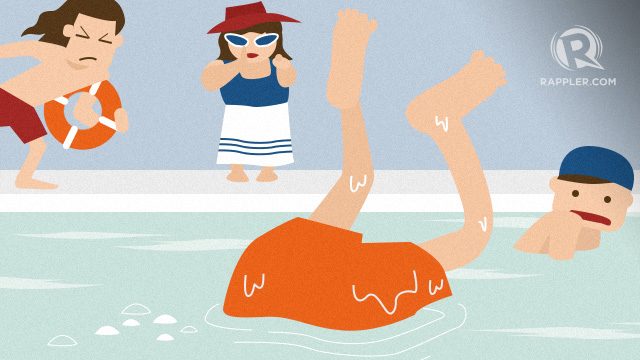SUMMARY
This is AI generated summarization, which may have errors. For context, always refer to the full article.

A girl dressed in skin-tight fabric wobbles on a beam no wider than her palm. She somersaults and lands firmly on the narrow plank like a cat thrown from a balcony. The grace of her movements belies the tension on her face and the tightness of her muscles. She’s adroit in the craft but appears slightly uncomfortable throughout the entire routine. She does one last handstand before dismounting onto the floor. She runs towards a man who looks pleased with her performance. She smiles, thinking she’s finally mastered the art of balancing.
Maybe tomorrow she’ll do it on a barbeque stick over a piranha tank.
This was how my mind tried to make sense of gymnastics the first time I ever saw the Olympics on television as a kid. I felt like an alien trying to comprehend something bizarre yet obviously revered by many, judging from the crowd’s thunderous applause. But all I could think of was, what planet am I on?
It was the 1984 Summer Olympics in Los Angeles and my family and I happened to be there for a holiday, in the middle of all the frenzy. It would be easy to think that we flew seven thousand miles from the Philippines to the West Coast of the Unites States to witness such a global event, but the truth was that we were there to shop, particularly for an Atari and cushioned toilet seats.
We flew for sixteen hours across the Pacific Ocean to purchase a video gaming console and a seat that made you want to stay in the toilet forever. There was no denying that I belonged to a household that valued sitting more than somersaulting from a springboard. Sports wasn’t our thing. So while everyone else was glued to their television screens at home, in restaurants, and even in shopping centers, rooting for their favorite teams, I stood with my mouth agape at almost every sports program I saw while hugging a Sam the Olympic Eagle stuffed toy, that year’s official mascot.
As if California wasn’t outlandish enough for a child from Manila, I had all this Olympic madness to grapple with. I could’ve been in Jupiter and not know the difference.
As though, suddenly, all the sports I never knew existed came crawling out of the woodwork like beasts from the underworld out to get a whiff of surface air once every four years and eat children like me who knew next to nothing about sports. At the time, my limited idea of sports mainly revolved around the familiar basketball, volleyball, soccer, and swimming. They were like fuzzy monsters I didn’t completely understand, but at least was familiar with.
One of the unfamiliar ones was boxing. I was dumbfounded the first time I saw two men punching each other with oversized gloves on a platform like a couple of misbehaving toddlers in a playpen. All that blood for a tacky gold belt? My mind searched for answers. What planet am I on?
Flashbacks of that first boxing match flooded my memory, as I stood wide-eyed in my aunt’s American kitchen watching one Olympic event after another. It felt like being introduced to hideous new monsters all in one go. I was enthralled and horrified at the same time, like watching a nature program featuring a giant spider eating a chihuahua.

Despite the day’s extra serving of oddity, nothing prepared me for what I saw next—synchronized swimming. It was so out of this world, I expected the swimmers to get beamed up to a flying saucer after their performance. My young brain almost exploded just trying to process its strangeness.
I thought that the synchronized swimmers looked like emotionally-disturbed women smiling and blinking underwater with legs for arms, behaving like Martians giddy with joy for finally finding the water they lost on their planet. I wondered what made one aspire to be a synchronized swimmer; if they’ve always had the urge to swim around the pool going nowhere, spending sixty percent of the time underwater with their legs up in the air. I also wondered whether they were former competitive swimmers who cracked under pressure (or been exposed to too much chlorine).
My first exposure to the Olympics as a critically-thinking child certainly left an impression on me, much deeper than the ass marks made by long jumpers on what looked to me like a kindergarten sand box. Whatever their origin, these athletic games helped shape my early opinion about sports – utterly strange.
Survival of the fittest
Sports is just one of the many human activities I find peculiar. I understand that most of them were designed to display speed, precision, flexibility, strength, and endurance.
But what exactly is our obsession with displaying speed, precision, flexibility, strength, and endurance? This need to showcase such extraordinary abilities must’ve come from our prehistoric genes, back when finding the right mate meant finding one who could actually outrun a hungry saber-toothed tiger. Such displays of agility back then probably meant proving one’s ability to stay alive long enough to raise a family, rather than competing to be the best in one’s age division for the sake of being number one. “Calling kids aged five to seven, it’s your turn to wrestle a crocodile!” Back then there was no such thing as sore losers – only dead ones.
This theory doesn’t quite explain synchronized swimming though. Could acting demented be an effective survival tactic? Do some shark species have a natural aversion to underwater acrobatics? I’m not sure. I haven’t actually tried hurling a shark into a pool with these crazy swimmers, tempting as it may sound. Would they still have the same plastered smile while being chewed to pieces?
When we were back in Manila, I was eager to finally find out what all the fuss was about, so I decided to execute synchronized swimming moves at a neighbor’s pool party one summer afternoon.
I was a good swimmer and decent dancer with an enthusiastic personality. I thought I had all the necessary qualities for a show-stopping performance that would make everyone at the party drop their popsicles and slow clap for me while shaking their heads in amazement. The problem was that I had no one to synchronize my moves with. So instead of looking like a nimble athlete with perfectly timed movements, I resembled a drowning cat. And indeed, I was desperate for air after swallowing what felt like half the contents of the swimming pool and clogging my ears and stinging my eyes with chlorine-filled water.
“Could this be the start of my synchronized swimming transformation?” I wondered. All the other kids were busy playing a game called Marco Polo while I fought for my life and sanity at the deep end of the pool, waiting for that beauty pageant smile to kick in. “Do I grow gills next?”
“Look! Is that boy drowning or dancing?” I heard one of the moms shout.
“If he was drowning, I don’t think he’d have that big smile plastered all over his face,” another mom replied.
“Holy Poseidon. I’ve turned into a synchronized swimmer,” I thought.
I pushed on, oblivious to the fact that I looked more like a duck bobbing in and out of the water searching for food than an Olympian going for gold. Yet I smiled and tried to keep my eyes open the entire time like a child being possessed by an aquatic demon. Despite the fake smile, I was in agony not only physically but also mentally because I couldn’t figure out why anyone in their right mind would intentionally do this – me included. I was also painfully aware that I wasn’t getting any medals for it.

After exhausting myself from all the splashing, kicking, twirling, and diving to imaginary orchestrated music, I decided to finally end my routine and save whatever pride I hadn’t yet swallowed along with the gallons of pool water already in my belly. I also didn’t want to run out of popsicles. I surfaced hoping to see perfect ten scores on the blackboard but instead drew disapproving glances from the other guests. “That kid swims like he’s having a seizure.”
Synchronized swimmers gained a bit of respect from me that afternoon as I thought about all the physical torture they must endure on a daily basis (and smiling while swallowing water does call for respect). If there’s anything I learned from almost drowning that day is that it doesn’t really matter what kind of sports you play as long as you do it with passion and dedication. If one day you realize you want to be a toe wrestler for the rest of your life, then strive to be the best goddamn toe wrestler in the world. At the rate we’re going, it could soon be an Olympic sport anyway.
Odd one out
In spite of my newfound respect for the hard work and discipline involved, I still grew up looking at sports as an outsider. I’m assuming my ability to look at sports from a distance stems from my own experience in looking at sports from a distance…quite literally…from the benches to be exact. I was never in it.
“So what sports do you play?” is a question I’ve always found odd, as if every breathing human being had to have one. And if you didn’t have one, this question is sometimes followed by a look that made you feel like a tax evader or someone who tortures kittens for fun. Sure, I tried all kinds of sports growing up but I was never drawn to any of them as much as I was drawn to sitting under a tree reading a picture book about gnomes. I was vice president of the library club in high school for crying out loud. My teachers should’ve just given up trying to include me in gym class.
For one, I was accident-prone and had bad coordination. I couldn’t distinguish left from right or top from bottom under pressure. In soccer, there were times I would kick the ball towards the opponent’s goal and score for them. Sometimes I’d even steal the ball from my own teammates. “Paolo! We’re on the same team! See? We even have the same red shirt to prove it,” my teammates would remind me. Apparently, I also couldn’t recognize primary colors under pressure.

My gym teacher would yell at me for looking unruffled, accusing me of not running the full four hundred meters every time she’d asked us to run around the oval track. She always suspected I took a detour to the canteen to have a nice cold drink because I looked like I’d just gotten out of a spa even after a tough exercise. “Mangahas! Do another round!” she’d yell at me and I’d exaggerate being out of breath after doing two laps around the track. And even then, I’d still look as fresh as I did when I arrived in school in the morning. “Mangahas! Why do you look so relaxed?” I hated her and wanted to shove my running shoes in her mouth. I felt like she was penalizing me for not having active sweat glands. Many times I was tempted to simply douse myself with a pail of water just to convince her. I was afraid she might ask me one day to lift a school bus just to check whether I had superpowers. And all that time I just kept thinking, what am I doing this for? I wasn’t obese. I had a healthy physique and active lifestyle. So why put me through all this?
A necessary evil
Despite my opinion, I’ve never advocated against sports altogether. I think sports are very important in building a sense of discipline and teamwork and more importantly, pushing the limits of human capacity (such as trying to sweat even if one can’t). And no doubt, sports are good for physical and mental health. Many individuals have in fact built stellar careers on sports. Plus if you’re a floor gymnast, your skills may come in handy in real-life, practical situations like, say, if you find yourself abducted by a dictator whose only condition for not executing you is if you danced like a deranged ballerina holding a stick with a very long ribbon attached to it. “Twirl that ribbon woman! Twirl it like your life depended on it!” These girls would probably go berserk in a gift shop.
I get it though. I understand exercise and what it does to the body. If you want to build muscle, you can lift weights. If you want to build endurance, you can run. If you want to lose weight, you can do aerobics. But if you want to build a healthy competitive spirit and teamwork, you can play Pokemon Go.
Last year I saw a game of curling on television. No, it wasn’t a hair salon challenge. It was that sport where players slide disks on a sheet of ice while sweeping its slippery path with brooms, looking like roof cleaners in the dead of winter. If I’m the only one who thinks that’s weird then I must really be on the wrong planet.
Many of us have grown so accustomed to the way things are that we’ve simply accepted them as normal. If we took a step back (let’s say, a few galaxies away), how “normal” would some of these activities seem to us? Would they seem logical or strange? Tug of war is a sport? Really? I’ve seen women in Bangkok perform tricks more deserving of gold medals. Humans are a funny bunch aren’t they?
Now, where did I park my spaceship?– Rappler.com
Paolo Mangahas is a Filipino writer who has published several essays on food, lifestyle, fashion, and social and environmental development in various publications in the Philippines and abroad. He is based in Singapore and heads marketing and communications for a regional marine conservation program. Follow him on Twitter or Facebook.
Are you an OFW with a story to share? Send them to balikbayan@rappler.com
Add a comment
How does this make you feel?
There are no comments yet. Add your comment to start the conversation.